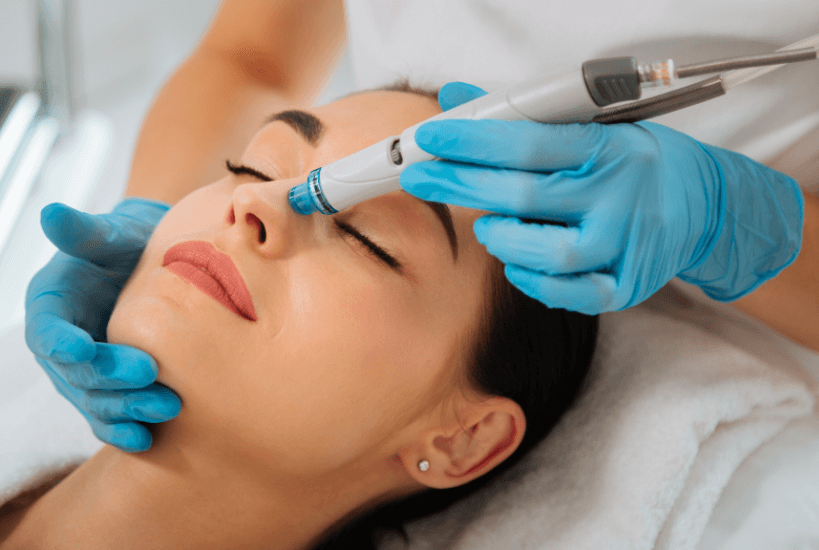In the pursuit of radiant skin, laser skincare treatments have emerged as a popular and effective option. With advancements in technology, these treatments offer targeted solutions for a variety of skin concerns, including pigmentation issues, acne scars, wrinkles, and more. This article delves into the different types of laser treatments available, their benefits, potential risks, and what to expect during and after the procedure.
Understanding Laser Skincare Treatments:
Laser Skincare Treatment in Dubai utilizes focused light energy to address various skin concerns. The laser light penetrates the skin and stimulates the underlying tissues, promoting healing and rejuvenation. Different lasers are used for different purposes, such as targeting specific skin layers or treating specific issues. The two main types of lasers used in skincare are ablative and non-ablative lasers.
Ablative Lasers:
Ablative lasers remove the outer layers of the skin, which can lead to significant improvements in skin texture and tone. Common types of ablative lasers include:
- CO2 Lasers: These are used for deeper skin resurfacing, effective in reducing wrinkles, scars, and other skin imperfections. CO2 lasers produce excellent results but require longer recovery times.
- Erbium Lasers: These are gentler than CO2 lasers and are used for superficial skin treatments. They are effective for fine lines, sun damage, and moderate wrinkles with a shorter recovery period.
Non-Ablative Lasers:
Non-ablative lasers work by heating the underlying skin tissue without damaging the surface. This encourages collagen production and skin tightening. Common types include:
- NdLasers: Effective for treating vascular lesions, hair removal, and improving skin tone, these lasers penetrate deeper without harming the surface.
- Alexandrite Lasers: Often used for hair removal, they are also effective for pigmentation issues and overall skin rejuvenation.
Benefits of Laser Skincare Treatments:
Laser treatments offer numerous benefits, making them a sought-after solution for those looking to improve their skin’s appearance. Here are some of the key advantages:
Precision:
Laser treatments allow for precise targeting of specific areas and concerns. This precision minimizes damage to surrounding skin, leading to quicker healing times.
Versatility:
Lasers can treat a wide range of skin conditions, including:
- Acne scars
- Hyperpigmentation
- Uneven skin tone
- Fine lines and wrinkles
- Sun damage
- Rosacea
- Enlarged pores
Long-lasting Results:
Many patients experience long-lasting results after completing a series of laser treatments. Collagen production continues to improve the skin's appearance over time.
Minimal Downtime:
While some treatments may require a recovery period, many non-ablative procedures involve minimal downtime, allowing individuals to return to their regular activities shortly after treatment.
What to Expect During the Procedure:
Before undergoing laser skincare treatments, it is essential to consult with a qualified dermatologist or skincare professional. They will evaluate your skin type, discuss your concerns, and recommend the most appropriate treatment plan.
Consultation:
During the initial consultation, the practitioner will assess your skin and discuss your medical history. They may also perform a patch test to determine your skin's reaction to the laser.
Treatment Process:
- Preparation: The treatment area will be cleaned, and a topical anesthetic may be applied to minimize discomfort.
- Laser Application: The practitioner will use the laser device to treat the targeted areas. You may feel a sensation similar to a rubber band snapping against the skin.
- Cooling Measures: Many devices are equipped with cooling systems to protect the skin and enhance comfort during treatment.
- Post-Treatment Care: After the procedure, the practitioner will provide aftercare instructions, including how to care for your skin and any necessary follow-up appointments.
Aftercare and Recovery:
Proper aftercare is crucial for optimal results. Here are some general guidelines to follow after laser treatments:
Keep the Area Clean:
Gently cleanse the treated area with a mild cleanser to avoid irritation. Avoid scrubbing or using harsh products.
Moisturize:
Use a recommended moisturizer to keep the skin hydrated and promote healing. Products with hyaluronic acid can be particularly beneficial.
Avoid Sun Exposure:
Protect your skin from the sun by wearing sunscreen with a high SPF. Avoid direct sunlight, especially during the initial healing period, as the skin may be more sensitive.
Follow-Up Appointments:
Attend any scheduled follow-up appointments to monitor your progress and address any concerns.
Potential Risks and Considerations:
While laser skincare treatments are generally safe, potential risks should be considered. These may include:
- Redness and Swelling: It is common to experience some redness and swelling post-treatment, which typically subsides within a few hours to days.
- Skin Discoloration: Some individuals may experience temporary changes in skin pigmentation, particularly those with darker skin tones.
- Infection: Although rare, there is a risk of infection if proper aftercare is not followed.
- Scarring: In rare cases, improper technique or post-care can lead to scarring.
It is essential to discuss these risks with your dermatologist to make an informed decision.
Conclusion:
Laser skincare treatments offer a promising path to achieving radiant skin, addressing a variety of concerns with precision and effectiveness. With the right treatment plan tailored to your individual needs, you can enjoy significant improvements in your skin's texture, tone, and overall appearance. As with any cosmetic procedure, proper consultation, treatment, and aftercare are vital to ensure optimal results and minimize risks. If you’re considering laser treatments, consult with a qualified professional to embark on your journey toward healthier, more radiant skin.





Comments